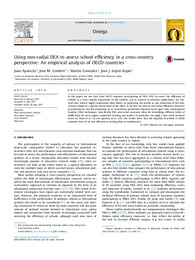Por favor, use este identificador para citar o enlazar este ítem:
https://hdl.handle.net/11000/6250Registro completo de metadatos
| Campo DC | Valor | Lengua/Idioma |
|---|---|---|
| dc.contributor.author | Aparicio Baeza, Juan | - |
| dc.contributor.author | Cordero, Jose M. | - |
| dc.contributor.author | González, Martín | - |
| dc.contributor.author | López Espín, José Juan | - |
| dc.contributor.other | Departamentos de la UMH::Estadística, Matemáticas e Informática | es |
| dc.date.accessioned | 2020-09-01T09:20:02Z | - |
| dc.date.available | 2020-09-01T09:20:02Z | - |
| dc.date.created | 2017-07-26 | - |
| dc.date.issued | 2020-09-01 | - |
| dc.identifier.issn | 0305-0483 | - |
| dc.identifier.uri | http://hdl.handle.net/11000/6250 | - |
| dc.description.abstract | In this paper we use data from OECD countries participating in PISA 2012 to assess the efficiency of schools in a cross-country framework. In the analysis, and in contrast to previous applications, we con- sider that schools might concentrate their effort s on improving the results in one dimension of the edu- cational output to a greater extent than in the other. To do this, we rely on non-radial efficiency measures of performance and the estimation of an educational production function based upon Data Envelopment Analysis (DEA) techniques. Specifically, DEA non-radial measures allow for identifying different levels of inefficiency for each output considered (reading and maths). In particular, we apply a non-radial measure based on Ando et al. [5] and Aparicio et al. [12]. Our results show that the majority of schools in OECD countries tend to be less efficient in reading than in mathematics | es |
| dc.description.sponsorship | Juan Aparicio and Martin Gonzalez thank the financial support from the Spanish Ministry for Economy and Competitiveness (Ministerio de Economía, Industria y Competitividad), the State Research Agency (Agencia Estatal de Investigacion) and the European Regional Development Fund (Fondo Europeo de DEsarrollo Regional) under grant MTM2016-79765-P (AEI/FEDER, UE) | - |
| dc.description.sponsorship | Additionally, Jose M. Cordero also acknowledges the support from the Spanish Ministry for Economy and Competitiveness through grant ECO2014-53702-P and Junta de Extremadura through grant IB16171 | - |
| dc.format | application/pdf | es |
| dc.format.extent | 12 | es |
| dc.language.iso | eng | es |
| dc.rights | info:eu-repo/semantics/openAccess | es |
| dc.subject | Data envelopment analysis | es |
| dc.subject | Non-radial measures | es |
| dc.subject | Least distance | es |
| dc.subject | Education | es |
| dc.title | Using non-radial DEA to assess school efficiency in a cross-country perspective: An empirical analysis of OECD countries | es |
| dc.type | info:eu-repo/semantics/article | es |
| dc.identifier.doi | 10.1016/j.omega.2017.07.004 | - |
| dc.relation.publisherversion | https://doi.org/10.1016/j.omega.2017.07.004 | - |

Ver/Abrir:
6-Aparicio_etal_Omega2018.pdf
774,92 kB
Adobe PDF
Compartir:
 La licencia se describe como: Atribución-NonComercial-NoDerivada 4.0 Internacional.
La licencia se describe como: Atribución-NonComercial-NoDerivada 4.0 Internacional.
.png)